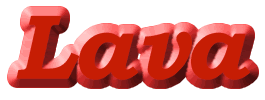What's hotter than Java?
 *)
*)
an experimental object-oriented rapid application development (RAD)
language
with type parameters ("virtual types"), refactoring, and extensive
static checks,
that prevent inadvertent access to uninitialized
variables and null objects
already at programming time.
The Lava programming environment LavaPE
replaces text editors
completely by structure editors.
It provides an inheritance notion not only for single
classes, but also for packages
(= collections of related classes, which may have type parameters, too).
See also the pertinent Wikipedia
article and the articles
linking to Lava.
Lava is an OpenSource
project. The Lava sources are managed at

Release 0.9.4 of Lava/LavaPE
is ready for download.
Release 0.9.4
is based on Qt 5.1.1 now; Qt 4 isn't supported any longer. A number of broken
links has been fixed in the online documentation.
The demand for new software grows continuously. Existing software has to
be changed and adapted to new requirements in ever shorter intervals. On
the other hand, the possibilities to recruit foreign programmers or to
increase the number of qualified domestic programmers are limited. Rather,
we shall be able to cope with this challenge only
 if the productivity (or simply: the speed) of the programming process
if the productivity (or simply: the speed) of the programming process
 and if program quality, comprehensibility, and, as a consequence, program
maintainability
and if program quality, comprehensibility, and, as a consequence, program
maintainability
can be decisively improved.
This means that we cannot stay with the presently popular programming
languages like Java and Visual
Basic. We have to aim for greatly improved programming languages
and RAD programming environments that fulfill
the following requirements:
 They relieve programmers from clerical
and error-prone work, and in particular:
They relieve programmers from clerical
and error-prone work, and in particular:
 they replace text-editing with structure-editing
throughout the program development process.
they replace text-editing with structure-editing
throughout the program development process.
 They prevent or detect errors already at programming time wherever
possible, for instance the omnipresent dangers
They prevent or detect errors already at programming time wherever
possible, for instance the omnipresent dangers
 They are easy to learn and get along with a minimum number of orthogonal
concepts.
They are easy to learn and get along with a minimum number of orthogonal
concepts.
 They support Lego-like composition and restructuring/refactoring
of programs.
They support Lego-like composition and restructuring/refactoring
of programs.
 They allow us to compose programs from small
functions and classes
that can be understood by themselves
They allow us to compose programs from small
functions and classes
that can be understood by themselves
 and decisively facilitate program
comprehension in this way.
and decisively facilitate program
comprehension in this way.
 They support smooth incremental
transition from OO analysis to OO design and implementation.
They support smooth incremental
transition from OO analysis to OO design and implementation.
 They unify what should not be separated ("embedded
SQL")
They unify what should not be separated ("embedded
SQL")
 and separate what should not be intermingled ("interfaces
and implementations").
and separate what should not be intermingled ("interfaces
and implementations").
 They facilitate reuse of certified components
and proven design patterns *)
They facilitate reuse of certified components
and proven design patterns *)
 from clearly documented component libraries,pattern
libraries and pattern languages *).
from clearly documented component libraries,pattern
libraries and pattern languages *).
The productivity of the software development process will be increased
considerably in this way, and the costs of software maintenance and
continuous adaptation to changing requirements will be reduced decisively.
The experimental programming language Lava
and the associated LavaPE programming
environment are based on a systematic
analysis of all those problems that currently impair the simplicity
of languages and tools and that in this way obstruct the productivity of
programmers, and they offer solutions to quite a number of these problems.
The overall approach of the Lava/LavaPEproject
is
to combine an uncompromising point-and-click programming style with a more
consistent, largely simplified and unified object-, component-, and
pattern-oriented conceptual framework.
A particularly attractive feature of LavaPE
is that it is perfectly point-and-click:
-
no text entry is required, neither for declarations nor for
executable code (except for comments, constants, and new identifiers);
-
no syntax learning, no syntactic errors, many other formal errors are
prevented, likewise, or are reported immediately at the moment when
they arise during program editing.
-
Renaming / rearrangement operations on Lava
declarations entail automatic updates of all existing references: Refactoring
support *)
is already provided by the basic LavaPE
structure editors.
These and many other features make Lava
particularly suited also for teaching object-oriented programming (and, to
some extent, also OO analysis and
design).
However, Lava isn't just the easy way of
programming. According to the motto less syntax, more semantics
Lava attempts to shift the programmer's
attention and efforts away from the meticulous observance of complex
syntactic rules towards a higher degree of "structured programming" and program
comprehensibility. As a natural consequence, this requires also a
higher degree of discipline, more conscious consideration, and it also
involves more fine-grained semantic distinctions in the Lava
language. The latter, in turn, enable more detailed consistency checks and
facilitate the comprehension of the roles that the various Lava
entities play in the respective application context. More thorough
consideration is required, for instance, with respect to
For descendants of Ch. Morgenstern's "Mr. Korf", who like
it short, here is a condensed list of the most outstanding
features of Lava. You may also download
our Lava project summary (1 page)
LavaProjectSummary.pdf
(~90KB, in English)
LavaProjektBlatt.pdf
(~125KB, in deutsch)
from our download
page where you can find also some more comprehensive papers on Lava.
Before you download the Lava/LavaPE
software (which includes the documentation) you may want to look into the
web-based version of the documentation (JavaScript must be enabled): 
and hopefully you won't view Lava as a blue
balloon thereafter (and this documentation as little more than Fish's
Night Song) . . .
(But we would also be content if Lava would
have the same effect on you as Korf's
novel kind of joke.)
It is quite clear that Lava, which is
currently being developed by two persons only, cannot compete with
commercial products like Java and Visual
Basic as to the comprehensive functionality, support,
maintenance, documentation, training, etc..
LavaPE is now in a state where you can use it
to produce little Lava programs and play
around with them in order to assess the new Lava
concepts and the new Lava look-and-feel of
object- and component-oriented program development in pure point-and-click
style.If you would like to discuss the Lava
design with us or if you would even like to contribute
one or the other component to the Lava
development, then don't hesitate to contact
us.
Imprint / Contact

 *)
*)
 Lava
Online Documentation
Lava
Online Documentation